1. The Six Ancient Pu'er Tea Mountains
The six ancient Pu'er tea mountains are located in Xishuangbanna Dai Autonomous Prefecture, concentrated east of the Lancang River. They are Yiwu (Mansa), Yibang, Gedeng, Mangzhi, Manzhuan, and Youle (Jinuo) tea mountains.
Yiwu: Located in the central and northern part of Mengla County, Xishuangbanna, it was the seat of the ancient Zhenyue County government. The Dai language translates Yiwu as "the land where the beautiful snake resides." Yiwu is famous for its tea and was the origin of the ancient Tea Horse Road, a historically renowned tribute tea town. From the mid-Qing Dynasty's tribute tea to the late Qing Dynasty's production and trading center of the six ancient tea mountains, and the legacy of famous teas like "Haoji" and "Yinji" that have been passed down to this day.
Quality characteristics: High aroma, soft and smooth tea soup, with a distinctive sweetness. The tea is mellow and rich in aroma, with a full-bodied sensation on the tongue and the mid-to-back part of the palate. High-quality tea has a sweet aftertaste that spreads to both cheeks.
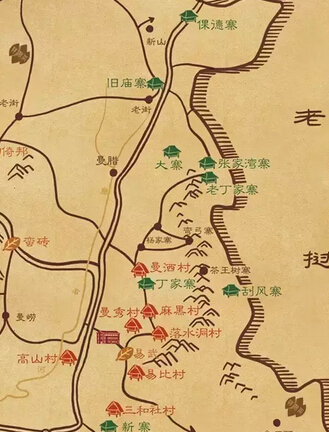
Yiwu's "Seven Villages and Eight Hamlets"
Yibang: Located in the central and northern part of Mengla County, Xishuangbanna, it belongs to Xiangming Township. In the Dai language, Yibang is called "Tangjing," meaning "tea well." Among the six ancient tea mountains, Yibang has relatively higher altitudes with significant variations. It includes villages like Yibang, Mansong, Xikong, Jiabu, and Mangong.
Quality characteristics: The small and medium-leaf varieties from Yibang are known for their unique aroma. The tea buds are slender, the soup is orange-yellow, and the palate is sweet with a hint of honey, slightly bitter, with a sweet aftertaste in the mid-to-back part of the tongue.
Gedeng: Gedeng is a Brown language term meaning "a very high place," located in Mengla County, Xishuangbanna, closest to Kongming Mountain. Gedeng's tea is primarily small and medium-leaf varieties.
Quality characteristics: The small and medium-leaf varieties are known for their unique aroma. The soup is orange-yellow with a natural fragrance, slightly astringent, sweet on the palate with a hint of honey, slightly bitter, with a noticeable sweetness on the tip of the tongue and a sweet aftertaste in the mid-to-back part. The soup is slightly thin.
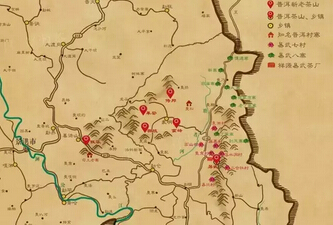
Mangzhi: Located in the central and northern part of Mengla County, Xishuangbanna. In the early Kangxi period of the Qing Dynasty, the Niuguntang area of the tea mountain became an important tea distribution center in the northern part of the six tea mountains.
Quality characteristics: The small and medium-leaf varieties are known for their unique aroma, similar to Yibang and Gedeng. The soup is deep orange-yellow, slightly bitter and astringent, with a strong sweet aftertaste and quick salivation. The palate is sweet with a hint of honey, the soup is soft, and the tongue has a strong stimulating sensation.
Youle: Located in Jinuo Mountain, Jinuo Township, Jinghong City, Xishuangbanna, it is the聚居地 of the Jinuo people. Famous villages include Situ Old Village.
Quality characteristics: The aroma and taste are similar to Yiwu, with a high aroma, soft and smooth tea soup, and a relatively high bitterness on the tongue. The tea trees are generally younger, and the tea is more intense.
Manzhuan: Located in the southern part of Xiangming Township, Mengla County, Xishuangbanna. The more famous villages in Manzhuan tea mountain are Manzhuang and Manlin.
Quality characteristics: The tea from Manzhuan tea mountain has a darker color, orange-yellow soup, a thick and smooth taste, slightly bitter on the tongue, with a strong sweet aftertaste and a deep aroma.
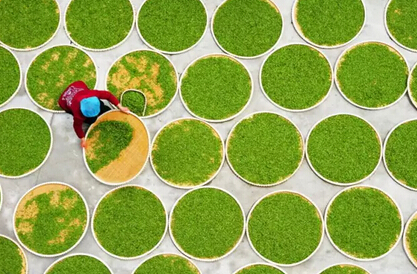
2. Famous Large Tea Mountains Outside the River
In addition to the six ancient tea mountains on the north bank of the Lancang River, there are other famous large tea mountains on the south bank of the Lancang River in Xishuangbanna, such as Nannuo, Mengsong, Bulang, Bada, Hekai, and Pasha. Additionally, adjacent to Menghai County in Xishuangbanna is the Jingmai tea mountain in Lancang County, Pu'er City. These are commonly referred to as the famous large tea mountains "outside the river."
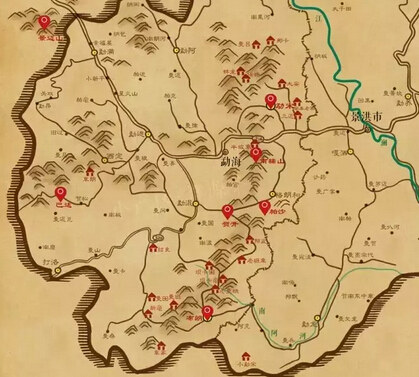
Nannuo: Nannuo, in the Dai language, means "bamboo shoot sauce." It is mainly located in Ge'anghe Township, Menghai County, Xishuangbanna, with the Hani people as the main residents. Famous villages in Nannuo Mountain include Banpo Old Village, Shitou Old Village, Bama Village, and Zhulin Village. In the early Republic of China, the tea areas of Che (Li) Fo (Hai) Nan (Qiao) south of the Lancang River gradually became the central production area of Pu'er tea, and Nannuo tea mountain became increasingly famous. In 1953, Mr. Zhou Pengju and others from the Yunnan Tea Research Institute discovered a cultivated "tea king tree" on the tea mountain of Banpo Village, Nannuo Mountain, estimated to be about 800 years old, making it the earliest cultivated tea tree in Xishuangbanna. Unfortunately, due to tourism development and ecological damage around the tree, it died in the 1980s.
Quality characteristics: Nannuo tea has long and tightly rolled leaves, a rich and thick aroma, a pure and sweet taste with a refreshing texture, a soft and full soup, and a slow but strong sweet aftertaste. It is a representative tea with high stimulation.
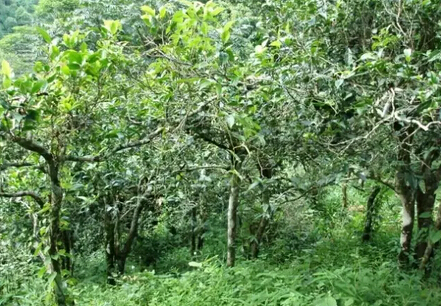
Bulang: Bulang Mountain is mainly located in the southern part of Menghai County, inhabited by the Bulang people. Famous villages in Bulang Mountain include Laobanzhang, Laoman'e, Xinbanzhang, and Manban.
Quality characteristics: Bulang tea varies significantly among villages. Overall, it has a strong and intense taste, with a霸道 tea气 and high stimulation. The入口 is bitter but quickly turns sweet, with long-lasting salivation. The aroma is rich, with subtle notes of plum, honey, and orchid.
Mengzhe: Mengzhe, originally called Nanqiao, is located in the largest坝子 of Menghai County. Its乔木茶树 do not form large forests, with mostly灌木. Mannong Village is located in Mengzhe.
Quality characteristics: The leaves are dark black, the soup is deep yellow, with a floral and honey aroma. The taste is thin and sweet, slightly bitter and astringent, with an average sweet aftertaste and salivation.
Mengsong: Mengsong here refers to the commonly known "Da Mengsong," located in Mengsong Township, east of Menghai County, Xishuangbanna, facing Nannuo Mountain across the Liusha River. The main residents are the Lahu people. Famous villages include Da'an, Nanben, Sanmai, Baotang, Banglong, Damanlv, and Naka.
Quality characteristics: Mengsong tea has a unique aroma. After brewing, the floral fragrance is pure and持久. The tea soup is饱满 and rich, with a thick texture. Most Mengsong teas are slightly astringent, with a slight bitterness that dissipates quickly. The salivation is on both cheeks, and the sweet aftertaste is long-lasting.
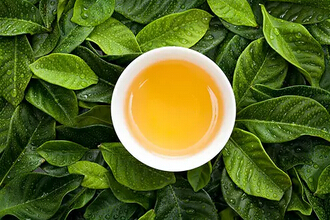
Jingmai: Jingmai means "new city" in the拉祜 language. It is located in Huimin Township, Lancang拉祜 Autonomous County, Pu'er City, with large areas of乔木型大茶树.
Quality characteristics: Jingmai tea generally has short and tightly rolled leaves, dark and shiny, with abundant white毫. The tea soup has a rich and持久 floral aroma, with a明显 and持久 sweetness and slight bitterness.
Bada: Bada is located in the western part of Menghai County, under Xiding Township, inhabited by the Hani, Bulang, and Lahu ethnic groups. Famous villages include Zhanglang and Hesong. In 1980, a野生型茶树王 was discovered on the Dahei Mountain in Hesong Village, reportedly 1,700 years old, with a height of 32.12 meters and a trunk diameter of nearly 0.9 meters. Unfortunately, due to old age and excessive decay, it died in 2012.
Quality characteristics: Bada Pu'er new tea mountain belongs to the乔木大叶种, with dark green and shiny leaves, a good aroma, and notes of plum and honey. The soup is orange-yellow and晶莹透亮. The tea from Zhanglang and Hesong villages is sweet, with a noticeable sweet aftertaste and quick salivation. However, the tea from the original Xiding Township area is relatively more bitter and astringent.
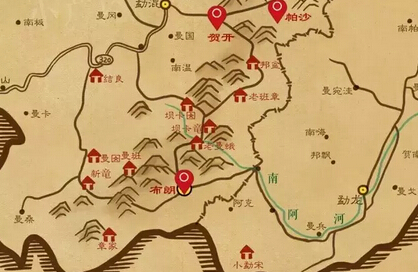
Pasha: Pasha is located in Ge'anghe Hani Township, Menghai County, southwest of the township government, mainly inhabited by the Hani people. The tea gardens in Pasha Village have large areas of大树成片, with the old village tea king tree having a trunk circumference of 2 meters and a height of about 10 meters, which is rare among ancient tea trees in Xishuangbanna.
Quality characteristics: Pasha tea has a greenish-yellow soup, a high and扬 aroma, a soft and smooth tea soup, with a细水路. The sweet aftertaste and salivation on the tongue are持久, with obvious层次变化 and a slight bitterness.
Hekai: Hekai tea mountain is located in the southwest of Menghun Town, Menghai County, mainly inhabited by the Lahu people. Hekai has large areas of大树茶园连片, with high观赏价值.
Quality characteristics: Hekai tea generally has dark and shiny tightly rolled leaves, slightly long, with a golden-yellow and bright soup. It is slightly bitter and astringent, with the astringency more pronounced than the bitterness. The bitterness turns sweet quickly, the astringency is slightly longer, the soup is饱满, and the cup底香 is明显 and持久.